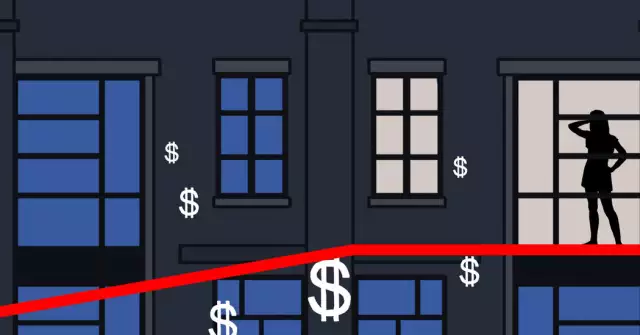A TikTok Video Sparked a Conversation About the Value of Landlord References
A TikTok Video Sparked a Conversation About the Value of Landlord References
It’s funny when comedy and real estate intersect. Or maybe not, as standup comedian Tom Cashman discovered when he was apartment hunting some months ago for a new place in Sydney, Australia. All had seemed to be going well for Cashman when his tenant application for a property he liked had been approved, but things took a turn when, out of sheer curiosity, Cashman asked the property’s real estate agent if the landlord had any references from their previous tenants. The fallout of this request resulted in several headaches, a viral video, and, quite the surprise, a legislative motion inspired by the whole ordeal. While Cashman’s story may be having huge implications for renters in Australia, it warrants a conversation about landlord references and whether the role technology plays offers enough transparency.
Cashman’s saga
Reviews are viewed as a proxy for experience, we have come to rely on reviews in order to make decisions about what we buy or the places we visit. How many restaurants have you visited because someone typed a glowing review on Yelp? How many have you avoided because of complaints of rude service? Cashman was happy to provide his “reviews” so that the landlord could get a sense of his character. But Cashman realized that throughout the rigorous reference process, he wanted to get a sense of who he would be renting from.
So, Cashman contacted the estate agent and asked if the landlord could provide references to see how responsive they are and if they adequately maintain their property. In a TikTok video Cashman made detailing the whole experience, he noted that the request was initially ignored. He followed up with his initial request to the real estate agent, to which he received a confused response:
“I’m sorry,” the agent replied, “I don’t understand your question.”
This is when Cashman admits that he “decided to get a little bit cheeky.” Since he still had plenty of time to find an apartment to move into, he felt he could risk the query. He wrote in his follow-up email:
“No worries! I was wondering if the owner would provide a reference written by a previous tenant of theirs recommending them as a landlord. I’ve found this is an effective way to find out if an owner is good to their tenants.”
Cashman’s response prompted a back-and-forth between him and the agent, which eventually resulted in him being told the landlord wasn’t required to provide a reference, nor were they in any contact with a previous tenant. The conversation took a turn when an email popped into his inbox. This email stated that per Cashman’s request, his application had been withdrawn. Here’s the thing, Cashman had never made that request. “They just withdrew me,” he said.
Fortunately, Cashman was able to find a place in the end, but his initial TikTok has raised awareness about rental rights. If landlords can request information on potential tenants, why shouldn’t tenants be able to do the same?
ACT-ing on landlord references
Empowered by Cashman’s TikTok, Michael Pettersson, a Member of the Legislative Assembly of the Australian Capital Territory (ACT) wanted to create a policy that codified the rights of his constituents to find a trustworthy landlord. “I saw the idea suggested by comedian Tom Cashman on TikTok and I could immediately see the benefits,” Pettersson said. “I’m a renter myself and I would like the ability to provide information to future tenants about my experience with the landlord.”
Pettersson believes it’s wrong that only landlords are allowed to do background checks, so he drafted a motion to address that. It’s a modest measure that will assist in resolving the power disparity between landlords and tenants. The motion also asks the ACT government to reiterate its commitment to preserving renters’ rights in the Territory.
Pettersson was successful in moving a motion to the Legislative Assembly in Canberra, the capital of Australia, to consider whether prospective tenants should be allowed to obtain references from landlords’ prior tenants. The Tenant’s Union ACT admits that this is more of a ceremonial start. “It will be interesting to see what happens next,” they said in a Facebook post. Nevertheless, there’s excitement brewing to allow tenants the right to ask landlords for references.
The industry response
Casman’s TikTok video became so popular that it eventually reached Hayden Groves, the president of the Real Estate Institute of Australia. Surprisingly, Groves publicly backed the comedian. As the head of Australia’s real estate body, Groves said that if a potential tenant asked for a landlord reference, he would gladly provide one. “I think it’s quite a reasonable request for a tenant to say, ‘Look, I just want to get a bit of a feel for how the landlord is,” Groves told ABC AU, “are they popping in all the time unannounced? Are they purporting to be looking at the garden or something like that?’” Groves also added that he believes most landlords would be happy to honor Cashman’s request.
On the other hand, Groves said that he is opposed to formalizing the system as he believes this would place real estate brokers in a difficult legal and ethical situation because they are supposed to act in the best interests of the landlord. But if landlord references get formalized, then his concerns are moot. The motion that Pettersson presented merely allows prospective tenants the opportunity to request a landlord reference, so if a real estate agent can’t get the landlord to provide them with a reference, they would simply inform the tenant that the landlord does not have one at the ready. Of course, that alone could wave a red flag for a prospective tenant, but Grove’s resistance to standardizing reference requests implies that landlord references are wholly bad for the landlord.
There is another side to the review process, If a landlord garners good reviews because they provide top-notch property management services to their tenants, then providing a reference from a previous tenant would indeed be in the best interest of the landlord. Groves also opposes the concept of a landlord register, claiming that additional regulation will deter property owners from leasing their properties, resulting in a reduction in availability and an increase in pricing. But again, Groves is effectively saying that transparency is bad for business.
Groves insists that despite the fact that landlords have no legal obligation to provide tenants with a reference, that tenant’s rights are still very well protected. “So well protected,” he said, “that we’re seeing landlords choosing not to buy residential investment properties in some jurisdictions because the weighting of residential tenancies laws are too far in favor of the tenant right now.” Indeed, residential tenancies in New South Wales are often tipped to the tenant’s favor. For instance, landlords face a penalty if they fail to provide their tenants with two hard copies or one electronic copy of what’s called a property condition report at the start of their tenancy. The report is intended to detail the general state of repair and condition of your property, including fittings and fixtures, on a room-by-room basis. Tenant references could work in a similar fashion, where outgoing tenants are prompted to provide a reference to their landlord. In time, this would avoid the hassle of having to track down past tenants and ask them to write up a review of what they remember about their living experience at the property.
Even if legislation requiring tenant references passes, the power imbalance that requires tenant references tries to address would still remain because a landlord usually deals with multiple applications for a single unit. If a landlord really felt that a prospective tenant asking for a reference would be a problem, the landlord can pick another candidate more easily than a tenant could pick another property. Landlords have little to risk with this requirement.
While there aren’t any new details yet on what’s become of Cashman’s legislative ripple effect (ACT is currently investigating how to implement the motion) the conversation of whether or not landlords should give tenant’s references upon request is stirring in the U.S., although not in any legislative circles. Mainly, Cashman’s saga is reigniting the conversation around landlord review sites, but that particular intersection of technology and transparency has one glaring issue.
The case for landlord reviews
For landlords and managers, ratings are both a risk and an opportunity. Just like restaurants, a positive rating or landlord review might make a unit stand out, especially in a congested market. Consequently, a bad review can blot the reputation of your property, and could very well lower your application rate and, in turn, drive down rents.
The concept of assigning a rating to landlords is not a new one. There have been numerous independent and regional attempts. Not all have made it, which is why Addressory.org, DoNotRent.com, and LandlordorSlum.com are all decaying in the internet’s void after going defunct. But there’s a laundry list of available sites where tenants can still post reviews of their landlords: ApartmentList.com, ApartmentRatings.com RateMyLandlord.com, ReviewMyLandlord.com, TenantLandlordRatings.com, WhoseYourLandord.com… and that’s just a handful.
As much as bad reviews can be for a landlord’s reputation, negative feedback from previous tenants is actually valuable data. Landlords and property managers can use not-so-shiny reviews to identify opportunities to improve their services and chances are, if they pay attention to them, they can quickly benefit from the many positive reviews they’ll reap. Whether it’s an online review or mandated in the form of a formal reference, testimonials from previous tenants could help multifamily landlords rather than hurt them.






